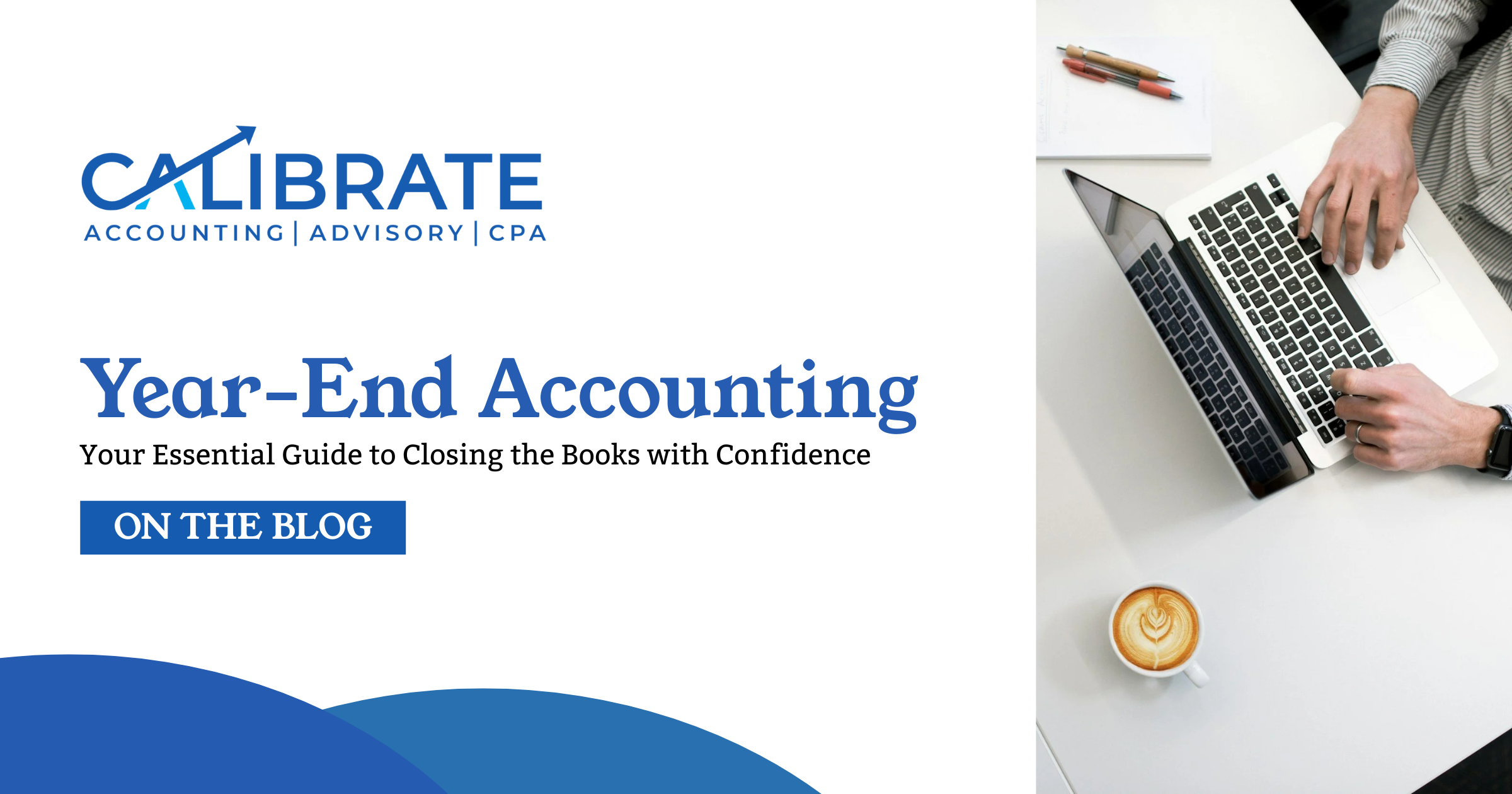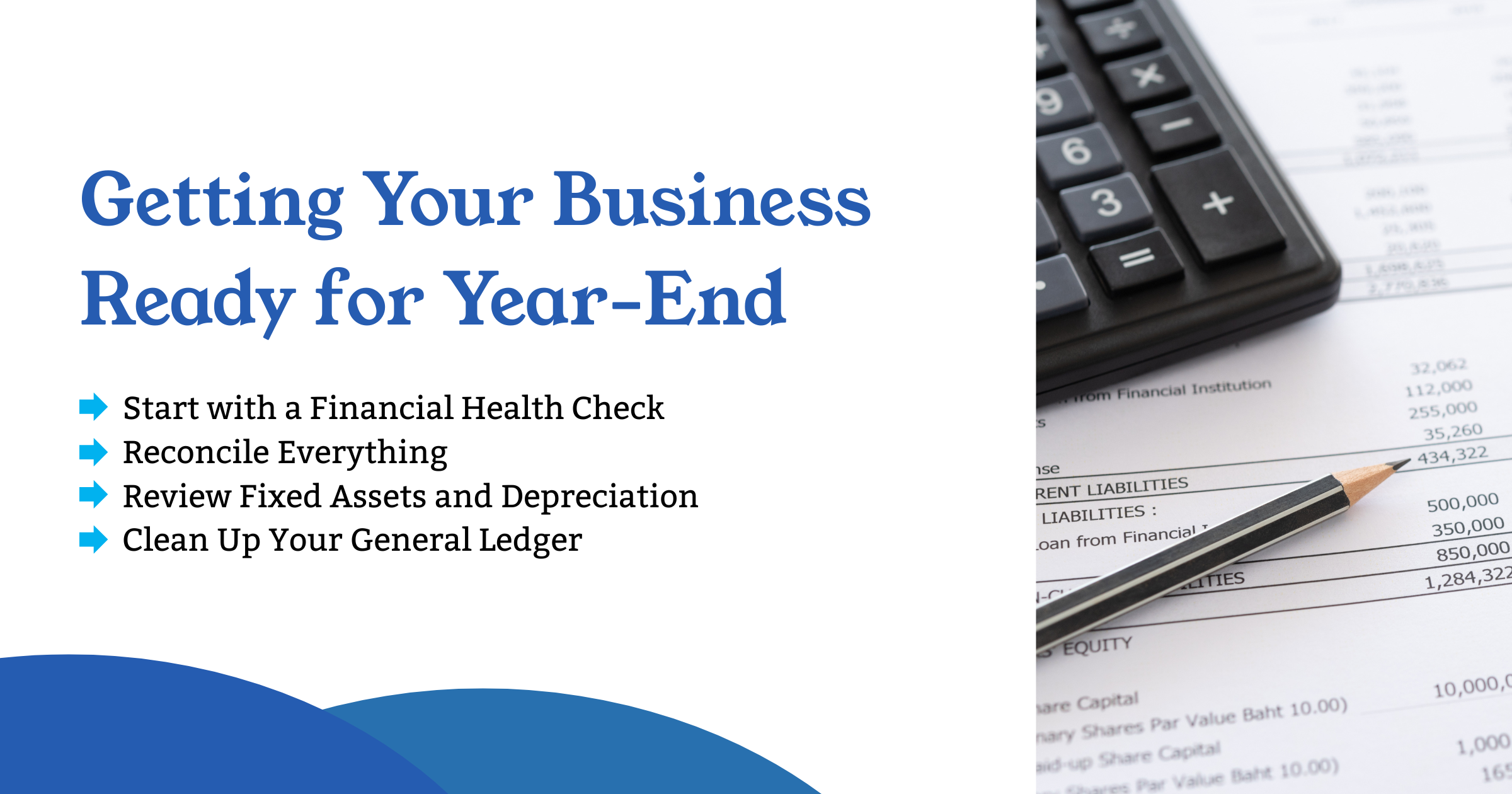Year-End Accounting: Your Essential Guide to Closing the Books with Confidence
As the calendar winds down and another year draws to a close, business owners face a crucial period that can set the tone for the year ahead. Year-end accounting isn't just about checking boxes for compliance. It's an opportunity to gain clarity, make strategic decisions, and position your business for sustainable growth.
Whether you're running a startup, managing a nonprofit, or operating an established business, understanding your year-end financial process is essential for success.
Why Year-End Accounting Matters More Than You Think
For many business owners, year-end accounting feels like a necessary chore rather than a strategic advantage. However, approaching this period with intention can transform your financial operations and decision-making capabilities for the coming year.
The right accounting partner doesn't just prepare your tax returns—they help you understand your cash flow, identify opportunities for tax savings, and ensure your financials tell the accurate story of your business.
When you work with a modern accounting firm that understands the unique landscape of your industry, you gain more than compliance support. You gain a partner who can help you navigate everything from sales tax regulations to strategic growth planning, all while ensuring your books are audit-ready and your tax burden is minimized through proactive planning.
Getting Your Business Ready for Year-End
The key to stress-free year-end accounting starts with preparation. Rather than scrambling in December or waiting until tax season creates urgency, successful business owners begin their year-end process well in advance. This proactive approach not only reduces stress but also creates opportunities for meaningful tax planning and strategic decision-making.
Start with a Financial Health Check
Before diving into year-end tasks, take a step back and assess your current financial position. Review your financial statements, including your profit and loss statement, balance sheet, and cash flow statement. If these documents aren't readily available or you're not confident in their accuracy, that's your first signal that it's time to strengthen your accounting processes.
Understanding your numbers isn't just about satisfying the IRS—it's about making confident decisions for your business. Whether you're considering hiring a new employee, expanding your services, or investing in new equipment, having accurate, timely financial data empowers you to move forward with clarity rather than guesswork.
Reconcile Everything
Account reconciliation is the foundation of reliable financial statements. Every bank account, credit card, loan, and line of credit should be reconciled monthly, but year-end is the critical moment to ensure nothing has been missed. This process catches errors, identifies potential fraud, and ensures your financial statements accurately reflect your business's true financial position.
Many business owners underestimate the complexity of proper reconciliation, especially as their businesses grow. What starts as a manageable task for a small operation can quickly become overwhelming when you're juggling accounts payable, accounts receivable, payroll, and multiple bank accounts. This is where expert accounting services become invaluable, ensuring nothing slips through the cracks during this crucial period.
Review Fixed Assets and Depreciation
Fixed asset management often gets overlooked until year-end, but it's essential for accurate financial reporting and tax planning. Review all assets purchased during the year, ensure they're properly recorded, and verify that depreciation schedules are accurate. Your business can benefit from various depreciation methods and tax deductions, including Section 179 expensing and bonus depreciation, but only if assets are properly tracked and reported.
Clean Up Your General Ledger
Your general ledger is the backbone of your accounting system. Year-end is the perfect time to review account classifications, clear out old accounts, and ensure everything is categorized correctly. Misclassified expenses not only muddy your financial picture but can also create problems during an audit or tax examination.
Strategic Tax Planning for Your Business
Effective year-end accounting goes far beyond tallying receipts and filing forms. Strategic tax planning should be an ongoing conversation throughout the year, with year-end representing the final opportunity to implement strategies that minimize your tax burden.
Income Tax Planning Opportunities
December 31st is the deadline for many tax-saving strategies. Consider accelerating deductible expenses into the current year or deferring income to the next year, depending on your situation. Maximize retirement plan contributions, review potential equipment purchases that qualify for immediate expensing, and assess whether any charitable contributions make sense for your business.
Understanding how state and federal tax laws interact—and taking advantage of available credits and deductions—can result in significant savings. This is where working with knowledgeable tax professionals who stay current with changing regulations pays dividends.
Sales Tax and Payroll Tax Compliance
Sales tax compliance requires attention to detail, especially if you sell products or services across multiple jurisdictions or online. Year-end is the time to ensure all sales tax has been collected, reported, and remitted properly. Similarly, payroll tax returns and W-2s require preparation and accuracy to avoid penalties and keep your team informed about their earnings.
The consequences of payroll and sales tax errors can be severe, including penalties, interest, and even personal liability for business owners. Having systems and processes in place—or partnering with professionals who specialize in these areas—provides peace of mind that compliance needs are handled correctly.
Cash Flow Management: The Lifeblood of Your Business
Understanding your cash flow is perhaps the most critical aspect of year-end financial planning. You might show a profit on paper, but if cash isn't flowing properly, your business faces serious challenges. Year-end is an excellent time to analyze your cash flow patterns and make adjustments for the coming year.
Creating Cash Flow with Purpose
Want to pay yourself consistently? Planning to invest in business expansion? Hoping to fund your retirement or build savings? Year-end analysis helps you understand whether your current cash flow supports these goals—and if not, what needs to change.
Working with a partner who understands your goals and actively collaborates with you to achieve them makes a tremendous difference. Rather than simply reporting historical numbers, forward-thinking accounting professionals help you model different scenarios, understand the cash flow implications of major decisions, and create systems that align your financial reality with your aspirations.
Improving Accounts Receivable and Payable
Review your aging reports for both receivables and payables. Are customers paying on time? Are there collection issues that need addressing? On the payable side, are you taking advantage of early payment discounts or strategically managing payment timing to optimize cash flow?
These operational details directly impact your cash position and should be part of your year-end review. Many businesses benefit from implementing better invoicing systems, adjusting payment terms, or establishing clearer collection procedures—changes that are easier to implement at year-end when you have a complete picture of the year's patterns.
Making Your Financials Audit-Ready
Even if your business isn't required to have an audit, maintaining audit-ready financials is a best practice that pays dividends. Clean, well-documented financial statements make tax preparation smoother, loan applications easier, and due diligence processes faster if you ever decide to sell your business.
Documentation and Support
Every transaction should have proper supporting documentation. Year-end is the time to ensure receipts, invoices, contracts, and other supporting documents are organized and accessible. In today's digital world, this often means implementing document management systems that make retrieval simple and secure.
Financial statement preparation, whether for reviews or compilations, requires this level of documentation. When your records are organized and complete, you can move confidently through tax season, banking relationships, and any other situation that requires financial disclosure.
The Value of Expert Partnership
While some business owners start their journey handling their own bookkeeping, most reach a point where professional support makes sense—and that point often comes sooner than expected. The question isn't whether you're capable of managing your own books; it's whether that's the best use of your time and whether you're capturing opportunities that expert guidance would reveal.
Modern accounting firms offer more than tax preparation. They provide CFO and controller-level support that helps you make better decisions with confidence. They help you navigate your financial journey with clear, actionable insights and direction. For entrepreneurs, startups, established businesses, and even nonprofits and local governments, having a team that understands your unique challenges makes all the difference.
The right accounting partnership means you always have someone you can call who understands your goals and keeps your financial interests front and center. Rather than viewing accounting as a cost center, forward-thinking business owners recognize it as an investment that positively impacts both their bottom line and their peace of mind.
Beyond Compliance: Setting Up for Success
As you complete your year-end accounting process, look beyond the immediate compliance needs to the strategic opportunities ahead. Year-end shouldn't just close out the past—it should prepare you for the future.
Implementation of New Systems
Many businesses use year-end as an opportunity to implement new accounting software packages or upgrade their financial systems. Starting fresh in January with improved tools and processes sets a positive tone for the entire year. Whether you need better job costing, improved reporting, or more efficient accounts payable processing, the transition between years is often the ideal time for implementation.
Goal Setting and Budgeting
Armed with complete year-end financials, you can create realistic budgets and forecasts for the coming year. What worked well? Where did expenses exceed expectations? What revenue opportunities emerged that you want to pursue more aggressively? Your year-end financial data provides the foundation for strategic planning that's grounded in reality rather than wishful thinking.
For startups, this might mean refining your cash flow forecasting, understanding your burn rate, and extending your runway. For established businesses, it could involve setting growth targets, planning capital investments, or exploring new markets. Whatever your goals, accurate historical financial data is essential for creating realistic, achievable plans.
Take Action Now
Don't let year-end accounting become a source of stress and uncertainty. Whether you're handling the process yourself or working with professionals, starting early and approaching it strategically transforms it from a burden into an opportunity.
If you're feeling overwhelmed by financial compliance, struggling to understand your numbers, or simply want to ensure you're making the most of this critical period, expert support is available. The right accounting partner provides stress-free, expert services so you can concentrate on what you do best—running your business.
Your financial questions don't have to wait for tax season. Year-round support means you feel confident in your financial decisions throughout the year, not just when deadlines loom. From monthly financial reporting to tax planning and consulting, from cash flow management to implementation of new systems, comprehensive accounting support ensures your business has the financial foundation it needs to thrive.
As another year comes to close, make this the year you gain clear insights into your business with accurate, timely financials. Implement ongoing tax planning strategies that minimize your burden. Complete all your business and personal taxes accurately, with the confidence that comes from expert guidance and year-round communication.
Every business deserves accounting partners who understand their industry, recognize the unique challenges of entrepreneurship, and provide the strategic support that makes sustainable growth possible. This year-end, invest in getting your financial house in order—your future self will thank you. If you need help getting organized for year-end, reach out to us here!


